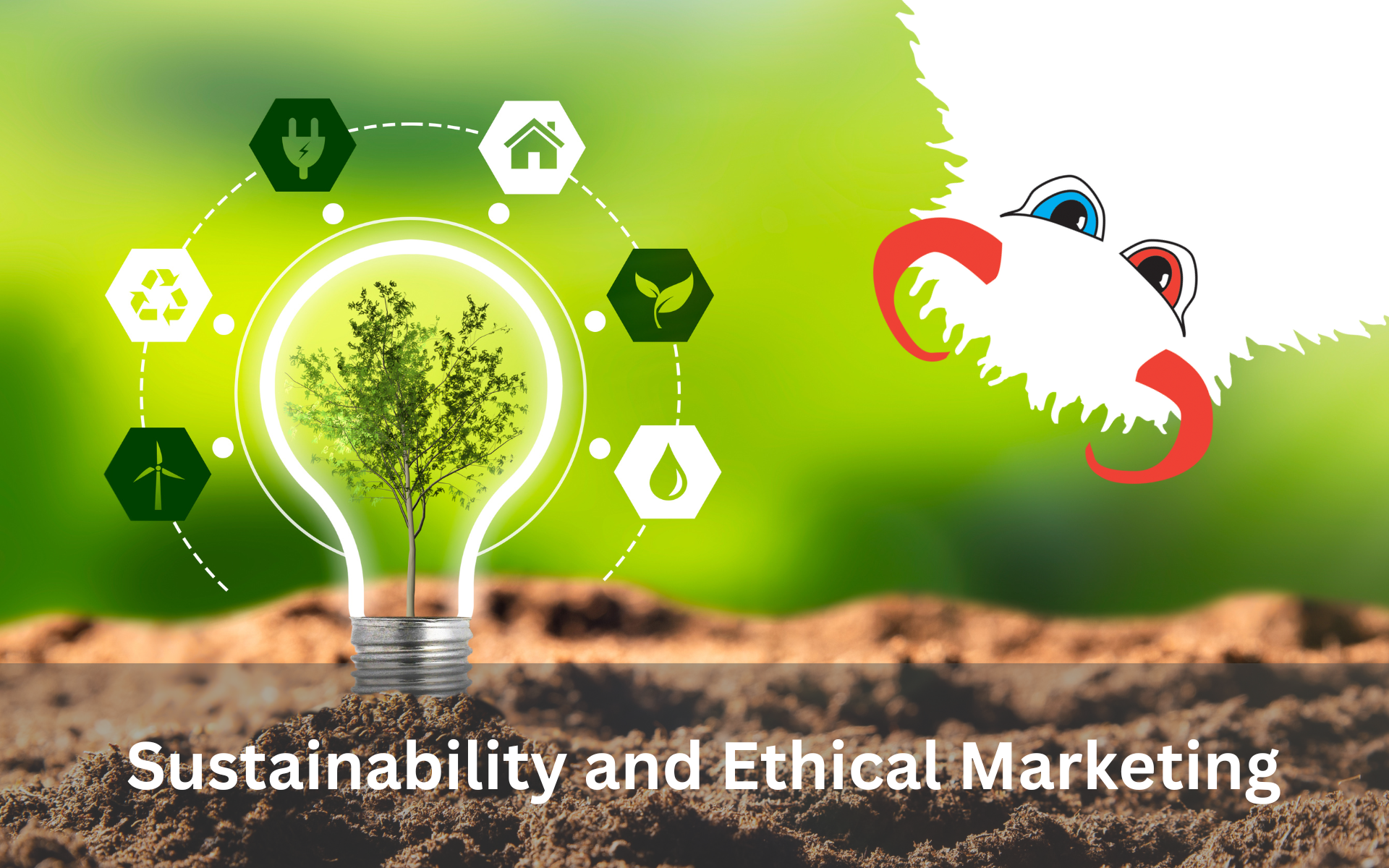
Sustainability and Ethical Marketing: A Cleaner Future, One Brand at a Time
Sustainability is no longer just a buzzword or a politically driven narrative; it has evolved into a strategic business imperative and a shared societal responsibility. While the debate rages on about the validity of climate change, one common thread unites us all: the universal desire to leave this world in a better state for our children and grandchildren. This collective aspiration has given rise to an innovative and impactful approach to business, especially in marketing. Today, sustainability and ethical considerations are not merely add-ons to a marketing strategy; they are central pillars guiding brand identity, consumer engagement, and product development.
In a world increasingly dominated by consumer choice, businesses can no longer afford to ignore their operations’ ethical and environmental implications. Consumers are increasingly aligning their purchasing decisions with their values, seeking out brands that reflect their concerns for the planet and its inhabitants. This shift in consumer behavior has made companies need to integrate sustainability into their marketing strategies genuinely and meaningfully. It’s no longer just about “going green” for optics. It’s about adopting a holistic approach encompassing ethical sourcing, transparent business practices, and a genuine social and environmental responsibility commitment.
In this article, we’ll delve into the nuanced relationship between sustainability and marketing, examining how some of the most successful companies in the world are making ethical considerations an integral part of their brand strategy. We’ll also explore how aligning your marketing strategy with sustainable practices is not just a moral choice but a financially prudent one, offering tax incentives and long-term customer loyalty as added benefits.
The Business Case for Sustainability
Financial Incentives

Many governments worldwide offer tax incentives for companies that adopt sustainable practices. These incentives are not just financial boons but strong messages that being environmentally responsible can be a win-win situation for businesses and the planet. It’s a clear indication from governments that they value and support corporate efforts towards environmental stewardship.
- Tax Credits for Renewable Energy: Companies can take advantage of significant tax credits by investing in renewable energy sources like solar or wind power. For instance, corporations that switch to solar panels reduce their energy costs and benefit from tax credits that offset the initial investment. This makes renewable energy an economically attractive option, in addition to its environmental benefits.
- Deductions for Energy Efficiency: Upgrading to energy-efficient appliances, lighting, or building materials can also provide valuable tax deductions. Companies like Tesla have leveraged these incentives to adopt energy-efficient manufacturing processes, demonstrating that sustainability can align with profitability. By making these upgrades, businesses can reduce their energy consumption, lower their utility bills, and receive tax benefits that make these investments even more appealing.
- Grants and Rebates: Several regions offer grants or rebates for businesses that undertake sustainable initiatives, further reducing the costs of these projects. These incentives can cover many efforts, from waste reduction and recycling programs to water conservation projects. Governments actively encourage businesses to innovate and adopt practices that contribute to a cleaner and more sustainable future by providing financial support.
Tax incentives for sustainability are more than just financial benefits. They represent a commitment from governments to support businesses in their journey towards more responsible practices. These incentives signal that sustainability isn’t just a moral or ethical choice; it’s a financially sound decision that aligns with broader societal goals. Businesses that recognize and leverage these incentives contribute positively to the environment and find new avenues for growth and competitive advantage. In an age where consumers are increasingly conscious of environmental issues, these government-backed incentives further underscore the importance of sustainability in modern business, providing both financial rewards and alignment with a growing global movement towards responsible stewardship of our planet.
Brand Image and Customer Loyalty
More and more consumers are actively choosing brands that align with their values. By positioning a brand as an environmental advocate, companies can attract a loyal customer base that appreciates and supports their ethical stance. This shift in consumer behavior reflects a broader societal trend towards sustainability and ethical consumption. In a world where information is readily available, consumers are more aware of their purchases’ social and environmental impacts. They seek brands that offer quality products and are committed to responsible business practices. This alignment between brand and customer values creates a deeper connection, fostering trust and loyalty. It’s not just about buying a product; it’s about supporting a cause and being part of a movement. Companies that recognize and embrace this shift can build stronger, more meaningful relationships with their customers, enhancing their brand image and establishing themselves as leaders in the growing ethical and sustainable business field. The success stories of companies like Patagonia and Seventh Generation underscore the potential of sustainability as a powerful tool for building brand loyalty and driving long-term business success.
Ethical Marketing: More Than Just Green
Ethical marketing isn’t just about promoting sustainable products or practices. It’s about conducting business aligning with broader ethical principles, such as social responsibility, fairness, and transparency. These principles are reflected in the products and every aspect of the business operations.
- Transparent Supply Chains: Brands like Patagonia provide transparency in their supply chains to show customers they are committed to ethical sourcing and production. This means openly sharing where and how products are made, the labor practices involved, and the environmental impacts of manufacturing. It’s a holistic approach that invites customers to see the complete picture of a product’s lifecycle, fostering trust and setting a standard for responsible business.
- Fair Trade Practices: Companies embracing fair trade principles ensure that producers in developing countries receive a reasonable product price. This commitment extends to providing fair wages, decent working conditions, and supporting sustainable agricultural practices. Brands like Ben & Jerry’s have leveraged fair trade as a core part of their mission, positively impacting the communities they source from and building a reputation for ethical business.
- Community Involvement: Engaging in community projects or supporting local causes builds trust and shows that a company cares about more than just profits. Whether investing in education, supporting local arts, or contributing to health initiatives, community involvement reflects a company’s broader values and can resonate strongly with customers. With its various community outreach programs, Starbucks demonstrates how this involvement can be integral to a brand’s identity.
Ethical marketing goes beyond merely being “green” or sustainable. It represents a comprehensive business approach considering every decision’s social, economic, and environmental impact. It reflects a commitment to values that resonate with a growing segment of consumers looking for more than just a product. They seek brands that stand for something, contribute positively to the world, and conduct business responsibly. This ethical stance can distinguish a brand in a competitive market, build lasting customer loyalty, and contribute to long-term success. The convergence of ethical principles with sound business practices is not just a trend; it’s a foundational shift in how modern businesses approach their relationships with customers and the world.
Leaving a Smaller Footprint: A Universal Goal
While the notion of climate change may be a subject of controversy, the desire to create a cleaner environment resonates with almost everyone. By reducing waste, minimizing pollution, and conserving resources, we can create a profitable world for businesses and be more pleasant for all its inhabitants. Reduce, Reuse, Recycle: Implementing a robust recycling program or using reusable packaging can significantly reduce a company’s environmental impact.
Conservation Efforts: Simple measures like conserving water or reducing energy consumption can dramatically affect a company’s ecological footprint. Sustainable Products: Offering products made from sustainable materials or using environmentally friendly manufacturing processes can appeal to conscious consumers.
- Reduce, Reuse, Recycle: Implementing a robust recycling program or using reusable packaging can significantly reduce a company’s environmental impact.
- Conservation Efforts: Simple measures like conserving water or reducing energy consumption can significantly affect a company’s environmental footprint.
- Sustainable Products: Offering products made from sustainable materials or using environmentally friendly manufacturing processes can appeal to conscious consumers.
Conclusion: A Future We Can Feel Good About

Ultimately, sustainability and ethical marketing aren’t just about good business but also good stewardship. They reflect a commitment to something greater than ourselves—a promise to future generations that we’ll do our part to leave the world cleaner and kinder.
While some may argue about climate change’s reality, few can dispute the innate satisfaction derived from knowing that our actions today can create a positive legacy for tomorrow. Whether through tax incentives or simply the warm feeling of doing the right thing, integrating sustainability into our marketing strategies is more than just a trend; it’s a path toward a future we can all feel good about.
Embrace a Brighter, More Sustainable Future
In the dynamic landscape of modern business, integrating sustainability and ethical practices is no longer an option; it’s a necessity. From enhancing brand image to tapping into valuable tax incentives, the journey towards sustainable practices offers tangible benefits that align with financial goals and ethical values.
Are you ready to be part of this vital movement? Whether you’re a Fortune 500 corporation or a small business with big dreams, the time to act is now. Embrace the strategies shared in this article, lead with integrity, and set your brand on a path that resonates with today’s conscious consumers and leaves a positive mark on our world.
Take the first step towards building a brand that stands for more than profits. Connect with like-minded partners, invest in sustainable practices, and let your business be a beacon of positive change. After all, the success of tomorrow’s business doesn’t just depend on the bottom line; it thrives on the ethical choices we make today.
Join us in this exciting journey towards a brighter, more sustainable future. Your brand, your customers, and our planet deserve nothing less.
About Brad Nietfeldt

As one of the most sought after digital marketing gurus in America, Brad’s entrepreneurial career involves writing and producing music, successful tech start ups, working for several fortune 500 companies and in his early 20s he was of the first support staff at the then start up currently known as PayPal.com. Learn more.
Let’s Work Together
TELL ME MORE ABOUT YOUR PROJECT
Want more traffic, leads, & sales?
We work with some of the world’s biggest and most reputable brands, why not allow us to work as an extension of yours? All it takes is a few seconds and a click to start the process.